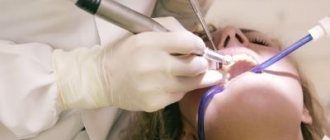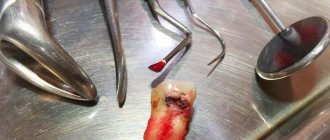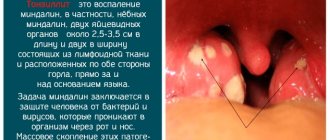Why do my gums or cheeks swell?
In most cases, swelling of the gums or cheeks is caused by purely dental reasons:
- Flux
During gumboil, the gums become swollen and painful, and the temperature rises. The development of a tumor begins with an ordinary carious cavity. It gets infected, which eventually leads to tooth decay. Pus accumulates and begins to look for a way out. The cheek swells greatly and a white spot appears on its surface. Without treatment, a fistula forms in this place, and the cheek turns into a huge purulent wound. If you do not seek help from a doctor in time, blood poisoning may occur.
- Removal of a tooth
This operation inevitably involves damage to soft tissue, and swelling is a natural phenomenon. After a while it subsides. If this does not happen, and the gums swell more and more, then you need to urgently visit a doctor. Causes of severe swelling can be:
- a large accumulation of pus,
- incipient periostitis (inflammation of the periosteum),
- infection in the wound.
If you notice swelling of the cheeks and gums, or tissues of the oral cavity, then you need to consult a dentist.
The doctor will determine the exact cause, begin treatment or refer you to another specialist.
Leave your phone number. The clinic administrator will call you back.
By leaving a request on the site, you consent to the processing of personal data
Make an appointment
Initial consultation with a dentist
For free!
- Inflammatory infiltrate
It usually occurs against the background of pulpitis or periodontitis. Pus begins to accumulate in the soft tissues, which causes the appearance of phlegmons and abscesses. It is considered a very dangerous disease because it can lead to big troubles.
- Periodontal disease
Swelling is accompanied by aching or sharp pain. There is no conservative treatment; surgical intervention is necessary. Often it is necessary to remove some teeth and install dentures.
- Teeth chips
The sharp edges of a destroyed tooth begin to scratch the inner walls of the cheek, which leads to inflammation and severe swelling.
- Wisdom tooth growth, pericoronitis
The eruption of the figure eight often leads to inflammation of the gingival hood. Swelling, as a rule, extends to both the cheek and gum.
- Carious teeth
Advanced caries often causes not only the gums to swell, but also the tonsils and cheeks. After eliminating the cause, the swelling gradually goes away. Folk remedies are useless here; urgent medical help is needed.
- Cyst
Depending on the type of cyst, its shape, and location, the doctor decides on conservative or surgical treatment. In some cases, a consultation with an oncologist may be required.
- Gum disease
Swelling is one of the main signs of inflammation of periodontal tissue. Without treatment, the disease quickly becomes chronic and difficult to treat. There is a high chance of losing a tooth.
In addition to the reasons listed, swelling of the gums and cheeks can be caused by:
- inflammation of the facial nerves;
- pathologies of the maxillofacial skeleton;
- allergies;
- disruption of the immune system;
- inflammation of the submandibular and parotid lymph nodes as a result of an infectious disease;
- malignant neoplasm;
- facial injury;
- diseases of internal organs, such as the heart;
- eye diseases;
- blood pathologies.
Causes
Most often, a tooth hurts due to inflammation of the neurovascular bundle (pulp) and surrounding tissues. Pain can also be caused by injury or tooth extraction.
Sometimes exposure to mechanical, thermal and chemical stimuli is required for acute pain to occur. For example, a tooth may hurt when biting or when exposed to hot food.
Pain sensations can be localized in one tooth or spread to neighboring ones, which is called secondary hyperalgesia. In addition, acute toothache can radiate to the ear, temple or throat.
That is why, when making a diagnosis, the doctor must focus not only on the patient’s subjective feelings, but also on the results of the examination. Radiovisiography, CT and radiography of the affected area will help to identify the cause of the pain.
What can you do before visiting the clinic?
Our dentists' recommendations will help you temporarily reduce discomfort.
- Wet a terry towel with cold water and apply it to the swollen cheek for 10-15 minutes. This compress will reduce pain and swelling.
- Do not heat the sore spot under any circumstances. Do not sleep on this side, do not tie it with a scarf, or apply a heating pad. Is it dangerous!
- Take a small dose of pain reliever. If it doesn't help, drink again after a few hours.
- Regular rinsing with warm infusions of sage, elecampane or valerian helps a lot.
- If your temperature rises, you can take an antipyretic. The medicine didn’t help, but the swelling and fever are increasing? Call an ambulance immediately!
What diseases can cause severe toothache?
Acute toothache can be a companion to many diseases of the oral cavity (and not only). Here are the most common ones.
Caries
A carious cavity occurs as a result of the process of demineralization and destruction of hard tooth tissues. Most often, pain appears after eating sour or sweet, cold or hot food.
Deep caries, which is accompanied by complete tooth destruction, turns into pulpitis and then pain occurs even without exposure to external irritants.
In some patients, the disease develops asymptomatically: pain appears only at the final stage, when the tooth cannot be saved.
Pulpitis
The source of pain is the neurovascular bundle, which is located inside the tooth. If it becomes inflamed, a person will know about it first by aching, and then by acute toothache, disturbing even at rest.
The pulp suffers, for the most part, from the activity of pathogenic microorganisms, especially streptococci and staphylococci. And untreated caries only makes the situation worse. Another cause of pulpitis is tooth trauma (fractures, enamel chips, crown fractures).
The negative influence of temperature or chemical factors is the most rare cause of the problem.
Gingivitis
The disease is characterized by inflammation of the gums (or a specific area). It is provoked by the same dental plaque, which, deposited in places that are difficult to reach for cleaning teeth, turns into tartar.
Gingivitis is accompanied by swelling and redness of the gums, bleeding and pinpoint hemorrhages, hyperemia, bad breath, and less commonly, the appearance of erosions.
More susceptible to it than others:
- children and adolescents whose teeth are actively growing,
- women taking oral contraceptives,
- women during menstruation,
- patients taking immunosuppressants,
- lovers of tobacco products, as well as spicy and hot food.
Stomatitis
A rather unpleasant phenomenon characterized by inflammation of the oral mucosa of various etiologies. If redness and swelling are observed, we can talk about catarrhal stomatitis, blisters - herpetic, ulcers - aphthous or ulcerative. In addition to pain, the patient may experience a burning sensation, especially after eating.
Stomatitis can be independent and accompany other diseases. They often accompany pemphigus, systemic scleroderma and streptoderma, and immunodeficiency states. But more often they appear on their own due to mechanical injuries, uncomfortable prostheses, and infections entering the body.
Periodontitis
With periodontitis, the tissues surrounding the tooth become inflamed, resulting in the destruction of the periodontal junction. In this case, the gums bleed and become inflamed, and sometimes abscesses and fistulas occur. Cavities are formed - periodontal pockets in which pus accumulates. Teeth become loose, to the point that they may fall out. An unpleasant odor appears from the mouth.
Periodontitis
The connective tissue (periodontal) surrounding the tooth root at the apex can also become inflamed and painful.
Usually this disease accompanies advanced caries, manifesting itself:
- pathological tooth mobility,
- acute pain in its area, intensifying at the slightest touch,
- swelling of the gums,
- swelling of the cheeks,
- increase in body temperature.
Complications of periodontitis:
- cysts and granulomas,
- perimaxillary abscesses,
- phlegmon,
- osteomyelitis,
- fistulas
The disease is insidious in that it can occur painlessly in the initial stages. In this case, the bone around the root slowly and imperceptibly dissolves, forming a granuloma (small sac) or a cyst - a large cavity.
If periodontitis is not treated, complications from internal organs may occur: glomerulonephritis, rheumatic lesions of the joints and heart valves.
Periostitis (flux)
Although “flux” does not sound so scary, in reality the disease is serious. This is an inflammation of the periosteum (periosteum) of the jaw body and the alveolar processes in which the teeth are located.
Periostitis begins with swollen gums, gradually spreading to the cheeks, lips, infraorbital or submandibular area.
The development of pathology can be started by injuries, inflammatory lesions of bone or soft tissue, rheumatic diseases, allergies, a number of specific infections, and less commonly, bone tumors.
Trigeminal neuralgia
Patients often complain of acute pain in a “dead” tooth.
This happens when the trigeminal nerve is affected, one of the pairs of cranial nerves that is responsible for the sensitivity of the face in general, the eyes and jaws in particular, as well as the activity of the masticatory muscles.
Trigeminal neuralgia can be caused by vascular pathologies, infections, cerebral tumors, changes in skull structures due to trauma, persistent otitis media, sinusitis, and dental deformation.
Temporomandibular joint dysfunction
This joint, like all others, is susceptible to injury and disease. Its dysfunction can be caused by unsuccessful yawning or prolonged opening of the mouth. As a result, it becomes difficult to open and close the mouth, causing crunching and clicking sounds. The pain intensifies when chewing, becoming unbearable, radiating to the temple and jaw.
Tumor
In addition to acute pain, jaw swelling may be accompanied by decreased sensitivity, tingling, heaviness in the jaw muscles or paralysis. Tomography (CT or MRI) will help identify it.
Eruption of wisdom teeth
Often, when the figure eight erupts, its “hood” becomes inflamed. This disease is called pericoronitis. It often occurs when a tooth erupts incorrectly. Pain can also occur due to contact of an incorrectly growing “eight” with a neighboring tooth. ENT diseases
These pathologies have nothing to do with teeth, but can cause acute toothache:
- otitis media,
- acute sinusitis of the upper jaw (sinusitis),
- allergic sinusitis.
Swelling of the cheek
Most often, pain in the cheek is associated with teeth, but situations are also possible when the cheek is swollen, but the tooth does not hurt. The cause may be an ear disease or inflammation of the parotid gland, so you may need to consult with several specialists to determine the true cause of the swollen cheek.
It should be remembered that swelling of the cheek, even if there is no pain, is a reason to consult a doctor. Inflammatory processes in the body can develop very slowly, but when the disease is advanced, it is much more difficult to cope with its consequences.
Treatment options
As you can see, most often cheek swelling is caused by dental problems. A visit to the dentist will allow you to assess the clinical picture and provide timely treatment. Paying attention to your health will help you avoid serious consequences and restore your face to its original appearance. If necessary, assistance from other specialists may be required.
In order to temporarily alleviate the situation, you can resort to traditional medicine, including the following recipes:
- A glass of boiled water with salt or soda diluted in it. They need to rinse their mouth. The procedure should be repeated three times a day until the problem is eliminated.
- Honey and chamomile decoction. These components have strong antiseptic properties. For this, 1 tbsp. l. liquid honey should be mixed in 1 liter of healing chamomile decoction. This product allows you to eliminate harmful bacteria, heal existing wounds, ulcers and other diseases. At the same time, you can moisten gauze in chamomile infusion, apply it to the swollen area for a quarter of an hour and do not wash it off.
- A decoction of oak bark, St. John's wort and sage will also eliminate swelling. To prepare it, mix all the components in equal proportions (their total weight should not exceed 150 g), pour in 1 liter of boiled water and leave to infuse for an hour.
Saline and soda solutions are effective
In order for the body to cope with infection and hidden inflammatory processes, it is necessary to strengthen the immune system. To do this, you can take a course of multivitamins and include as many fresh fruits and vegetables in your diet as possible. Traditional medicine also recommends using rosehip syrup.
The problem of swollen cheeks due to dental diseases or any other pathologies is very common. It can be easily dealt with; the main thing is not to ignore this condition and seek qualified help in a timely manner.
The article was prepared under the editorship of doctors - dental implantation center ICDI ROOTT
Pre-medical measures
If your cheek hurts, before visiting the dentist you can take some measures to alleviate the condition:
- Apply ice, a cold compress, or a bandage to the affected area;
- Take an analgesic;
- Rinse your mouth 3-4 times a day with a warm solution of antiseptic drugs, a salt solution or a decoction of herbs that have an anti-inflammatory effect.
Under no circumstances should you apply warm compresses to the painful area, as this may trigger the onset of a purulent process. You should also not take antibiotics without a doctor's prescription.
To prevent cheek pain, you should practice good oral hygiene. During the cold season, it is important to keep your face warm, as hypothermia can cause sinusitis and other inflammatory diseases of the ear, nose and throat.
Video from YouTube on the topic of the article:











